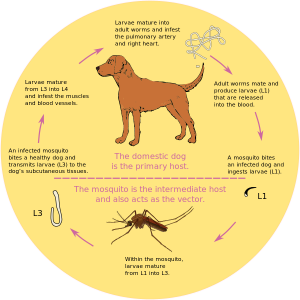
The Cycle of Heartworm
Is your dog showing signs of fatigue? Is this followed by a persistent cough, loss of appetite, and moderate activity? Then, your dog may have heartworms.
Yes, it’s exactly what it sounds like ― worms in the heart!
This disease can infect both cats and dogs, and the result can be deadly. In fact, according to the American Heartworm Society (AHS), more than 1 million dogs in the US are currently suffering from heartworm disease. A report stated that the disease is spread in all 50 states and usually infects pets in temperate regions.
AHS established Heartworm Awareness Month in April 1974. Since then, great strides have been made to inform people about this disease. AHS offers an incidence map that reveals in which area a dog or cat was recently infected. The information provided by AHS also includes heartworm guidelines and educational materials in multiple languages.
Let’s take a look at the basics of heartworm disease:
How Heartworm Disease Infects Pets
Heartworm disease is caused by Dirofilaria immitis, a parasitic worm that spreads through a mosquito bite. In this scenario, the dog is the host, and the mosquito is the carrier. When a mosquito bites a dog with heartworms, it gets infected with the offspring called microfilariae. In the next 14 days, under certain environmental conditions, the offspring develop and prepare themselves to transfer to a new host. When this mosquito bites another dog, the larvae enter the pet’s bloodstream.
The larvae mature into adults in the next seven months, and the offspring are then released to travel through different organs, reach the lungs, enter the arteries, and finally infect the heart. Adult heartworms can live up to 7 years in dogs and three years in cats.
Signs of Heartworms in Dogs
The signs of heartworm are hard to detect in dogs. The longer the offspring stay in the bloodstream, the more severe the symptoms will be. These include:
- Mild persistent cough
- Decreased appetite
- Lethargy
- Weight loss
- Lack of activity
Signs of Heartworms in Cats
In cats, the signs of heartworms are either subtle or dramatic. These include
- Asthma-like attacks
- Coughing
- Lack of appetite
- Periodic vomiting
- Weight loss
How Is Heartworm Disease Treated
Three different options help prevent and treat heartworms in pets. For dogs, monthly topical preventatives, twice-yearly injection, and monthly oral preventatives help prevent them from getting infected in the first place and kill the worms in the offspring stage.
Monthly topical preventatives are what are usually used for cats. However, we strongly recommend that you take your pet to a vet and get a complete checkup.
Keep an eye on your pet and make sure his diet includes the right foods. When going to parks, avoid any play in stagnant water. To ensure your dogs listen to your cues and stay away from sources of infection, you should train your dog to follow your cues in any situation.
If you are having trouble training your pet, get a professional force-free dog trainer. For dog training in Miami, visit the website Dances with Dogs. They offer in-person and online dog training. To know more about their services or schedule an appointment, call on 786-299-1552.
